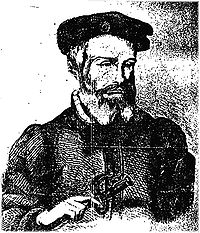
Guillén de Castro y Bellvis
Encyclopedia

Spain
Spain , officially the Kingdom of Spain languages]] under the European Charter for Regional or Minority Languages. In each of these, Spain's official name is as follows:;;;;;;), is a country and member state of the European Union located in southwestern Europe on the Iberian Peninsula...
dramatist of the Spanish Golden Age
Spanish Golden Age
The Spanish Golden Age is a period of flourishing in arts and literature in Spain, coinciding with the political rise and decline of the Spanish Habsburg dynasty. El Siglo de Oro does not imply precise dates and is usually considered to have lasted longer than an actual century...
.
A Valencia
Valencia (city in Spain)
Valencia or València is the capital and most populous city of the autonomous community of Valencia and the third largest city in Spain, with a population of 809,267 in 2010. It is the 15th-most populous municipality in the European Union...
n by birth, he soon achieved a literary reputation. In 1591 he joined a local literary academy called the Nocturnos. At one time a captain of the coastguard, at another the protégé of Benavente, viceroy of Naples
Naples
Naples is a city in Southern Italy, situated on the country's west coast by the Gulf of Naples. Lying between two notable volcanic regions, Mount Vesuvius and the Phlegraean Fields, it is the capital of the region of Campania and of the province of Naples...
, who appointed him governor of Scigliano
Scigliano
Scigliano is a town and comune in the province of Cosenza in the Calabria region of southern Italy.- Immigration : - Demografic Stats...
, patronized by Pedro Téllez-Girón, 3rd Duke of Osuna
Pedro Téllez-Girón, 3rd Duke of Osuna
Pedro Téllez-Girón, 3rd Duke of Osuna was a Spanish nobleman and politician. He was the 2nd Marquis of Peñafiel, 7th Count of Ureña, Spanish Viceroy of Sicily , Viceroy of Naples , a Knight of the Order of the Golden Fleece since 1608, Grandee of Spain, member of the Spanish Supreme...
and Gaspar de Guzmán, Count-Duke of Olivares
Gaspar de Guzmán, Count-Duke of Olivares
Don Gaspar de Guzmán y Pimentel Ribera y Velasco de Tovar, Count-Duke of Olivares and Duke of San Lúcar la Mayor , was a Spanish royal favourite of Philip IV and minister. As prime minister from 1621 to 1643, he over-exerted Spain in foreign affairs and unsuccessfully attempted domestic reform...
, Castro was nominated a knight of the order of Santiago in 1623. He settled at Madrid in 1626, but died there in such poverty that his funeral expenses were defrayed by charity.
He probably made the acquaintance of Lope de Vega
Lope de Vega
Félix Arturo Lope de Vega y Carpio was a Spanish playwright and poet. He was one of the key figures in the Spanish Golden Century Baroque literature...
at the festivals (1620-1622) held to commemorate the beatification and canonization of St Isidore, the patron saint of Madrid. On the latter occasion Castro's octavas were awarded the first prize. Lope de Vega dedicated to him a celebrated play entitled Las Almenas de Toro (1619), and when Castro's Comedias were published in 1618-1621 he dedicated the first volume to Lope de Vega's daughter.
The drama that has made Castro's reputation is Las Mocedades del Cid (ca 1605-1615), to the first part of which Pierre Corneille
Pierre Corneille
Pierre Corneille was a French tragedian who was one of the three great seventeenth-century French dramatists, along with Molière and Racine...
was largely indebted for the materials of his tragedy. The two parts of this play, like all those by Castro, have the genuine ring of the old romances; and, from their intense nationality, no less than for their primitive poetry and flowing versification, were among the most popular pieces of their day. Castro's Fuerza de la costumbre is the source of Love's Cure
Love's Cure
Love's Cure, or The Martial Maid is an early seventeenth-century stage play, a comedy in the canon of John Fletcher and his collaborators. First published in the Beaumont and Fletcher folio of 1647, it is the subject of broad dispute and uncertainty among scholars...
, a play in the John Fletcher
John Fletcher (playwright)
John Fletcher was a Jacobean playwright. Following William Shakespeare as house playwright for the King's Men, he was among the most prolific and influential dramatists of his day; both during his lifetime and in the early Restoration, his fame rivalled Shakespeare's...
canon. He is also the reputed author of El Prodigio de los Montes, from which Calderón
Pedro Calderón de la Barca
Pedro Calderón de la Barca y Barreda González de Henao Ruiz de Blasco y Riaño usually referred as Pedro Calderón de la Barca , was a dramatist, poet and writer of the Spanish Golden Age. During certain periods of his life he was also a soldier and a Roman Catholic priest...
derived El Mágico prodigioso.

